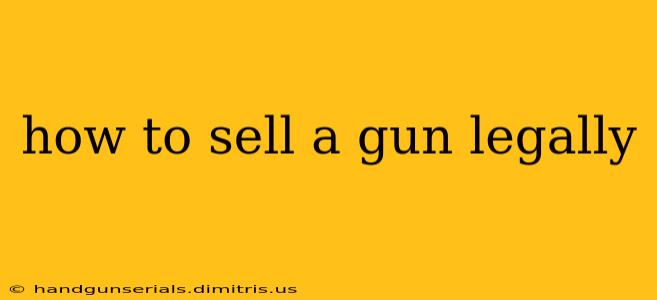Selling a firearm legally can seem daunting, but understanding the regulations ensures a smooth and compliant process. This guide outlines the key steps involved, emphasizing the importance of adhering to federal and state laws, which vary significantly. Always prioritize safety and legality throughout the entire process.
Understanding Federal and State Laws: The Foundation of Legal Gun Sales
Before you even consider listing your firearm, familiarize yourself with both federal and your specific state's laws regarding firearm sales. These laws dictate who can legally purchase firearms, the required documentation, and the procedures for transferring ownership. Ignoring these regulations can lead to serious legal consequences.
Key Federal Regulations:
- The Gun Control Act of 1968 (GCA): This act establishes the foundation of federal gun control in the United States. It defines licensed dealers, prohibits certain individuals from possessing firearms, and outlines regulations for interstate firearm sales.
- The National Firearms Act (NFA): This act regulates certain types of firearms, such as machine guns, silencers, and short-barreled rifles and shotguns, requiring registration and special licenses for their sale and transfer.
State-Specific Regulations: The Crucial Detail
Federal law provides a baseline, but state laws often add further restrictions. Some states may require background checks for all firearm sales, including those between private citizens. Others may have specific waiting periods or limitations on the types of firearms that can be sold. Researching your state's specific laws is absolutely critical. You can typically find this information on your state attorney general's website or through a search for "[Your State] firearm sales laws."
Steps to Legally Sell a Firearm: A Practical Guide
Once you understand the relevant laws, follow these steps to ensure a legal and safe transaction:
1. Verify the Legality of the Sale:
- Check your state and local laws: Ensure the firearm you're selling is legal to own and sell in your jurisdiction. Certain firearms may be restricted or prohibited.
- Check the firearm's condition: Be sure the firearm is in working order and safe to operate. A malfunctioning firearm poses a safety risk.
2. Identify the Buyer:
- Ensure the buyer is legally eligible: Federal law prohibits sales to individuals prohibited from owning firearms (e.g., convicted felons, those with certain domestic violence convictions, etc.). State laws may add additional restrictions. Never sell to anyone you suspect is ineligible.
3. Conduct the Transaction:
- Consider using a licensed firearms dealer: This is often the safest and most legally sound option. Licensed dealers conduct background checks and handle all the necessary paperwork, eliminating potential legal risks.
- If selling privately: Familiarize yourself with your state's laws regarding private firearm sales. This may involve conducting a private background check or following specific transfer procedures. Document the transaction thoroughly. Keep records of the buyer's identification, date, time, location, and firearm serial number.
4. Safe Handling and Transportation:
- Unload the firearm: Always ensure the firearm is unloaded and safely secured before handling or transporting it.
- Proper transportation: Transport the firearm in a locked case or container.
Additional Considerations:
- Advertising your firearm: Be mindful of the laws concerning advertising firearms, especially online.
- Pricing your firearm: Research similar firearms to determine a fair market price.
Disclaimer:
This guide provides general information and should not be considered legal advice. Consult with a legal professional or your local law enforcement agency for specific guidance regarding firearm sales in your area. The laws surrounding firearm sales are complex and frequently change. Always prioritize safety and compliance with all applicable laws.

